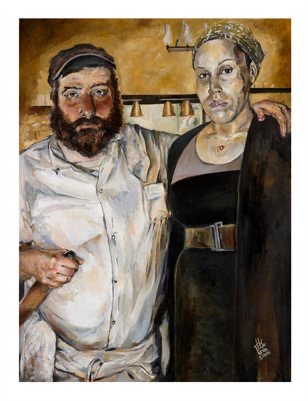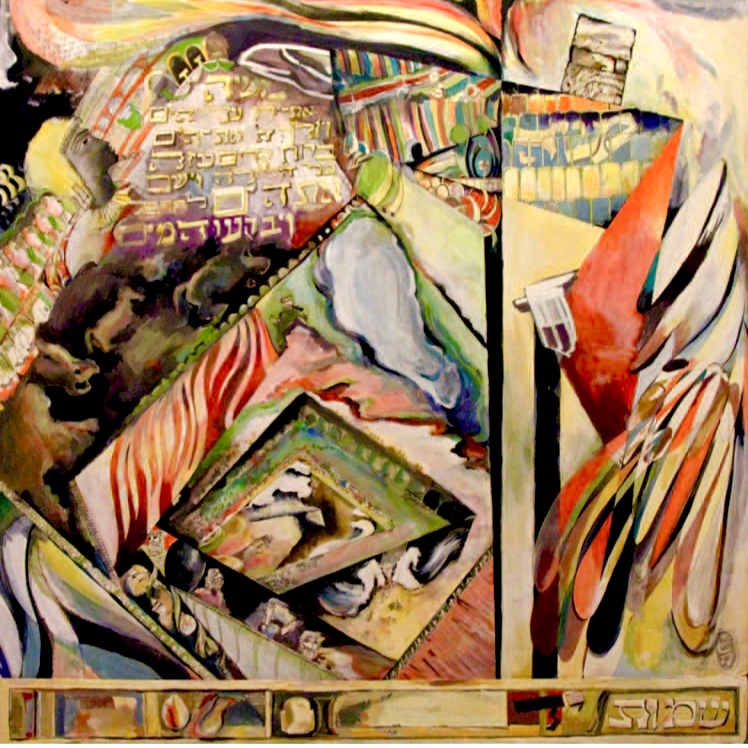Torah Study Date
Saturday, March 25, 2023
Verses Covered
Exodus (Sh’mot) 4:20-4:31
Next Session
Saturday, April 2, 2023
Starting at Exodus 5:1
Last week, we discussed Moses taking his wife and sons back to Egypt. We wondered about the plural since only one son has been mentioned, Gershom. Moses and Zipporah have another son, Eliezer, the second born, but he will not be named until later in Exodus.
Then we discussed YHVH telling Moses that he should perform for Pharaoh all the wonders God had put in his hand and that God would strengthen Pharaoh’s heart so that he would not let the Israelites go. We revisited the topic of free will—or of some kind of freedom—and wondered about YHVH’s apparent denial of Moses’ freedom since it is due to YHVH strengthening Pharaoh’s heart that he did not let the Israelites go. We discussed the meaning of the word translated, variously, strengthen, toughen, stiffen, harden (‘achazeik’). We also discussed the word ‘lev’ or heart and that the heart in Torah is not just feeling but also understanding and intention. We talked about the fact that YHVH needs the plagues in order to defeat Pharaoh who, after all, is another god and so must be demoted in prestige and shown to lack power. None of this lessened the issue of denying Pharaoh his freedom and, even more, punishing him for not exercising it.
We considered two ways of accounting for this (though we did not all endorse the two ways but at least considered them). One way is to assume that YHVH did not qualitatively change Pharaoh’s heart but simply toughened it, that is, made it a stronger version of what it already was. Another is Maimonides’ view that (and this takes looking ahead which we generally do not do) the fact that in the plagues that are to come, several beginning ones are not described as God toughening Pharaoh’s heart but as Pharaoh’s heart toughening suggesting that it was only after Pharaoh freely did not let the Israelites go that God stepped in and toughened Pharaoh’s heart so that he would be sure not to let the people go. Toughening his heart would, then, be a punishment because, with a tough heart, he would not be able to repent. Moreover, the story would show that human beings do have free will—but that even free will belongs to God and can be taken away (as interpreted by Shaul Magid).
We also discussed the idea that God knows present, past, and future (since/if God knows everything) so that when he says what Moses will do, it’s like someone who has seen a football game and tells someone who is watching the game on TV what the quarterback does in the game because he has already seen it. The quarterback acted freely in the game. It’s just that God has always already seen the game. We weren’t sure what to make of this (from Rabbi Sacks) and probably could have discussed it for a long time.
We discussed YHVH saying that Israel is his firstborn. We connected that to the firstborn Egyptians who would be killed in the plagues. We noted God saying, Israel (that is, the Israelites) is my firstborn. If you do not let my firstborn go (to worship me), I will kill your firstborn.
We then discussed the odd story of YHVH encountering Moses, who was on his way to a night camp, and seeking to kill him. We had trouble with the idea of a good God trying to kill his firstborn son—in addition, to kill the one whom he had commissioned to get the Israelites out of Egypt. We noted the possibility that the material in the story was from an earlier era. We talked about Zipporah taking a flint and circumcising Moses’ son, apparently so that God would not kill Moses. We noted that circumcision has already been commanded. We also noted that it is Moses’ wife who circumcises the son not, as is customary, the male (Moses). We connected that to Moses in general not being terribly identified with the Israelite people, given that circumcision is a mark of identity. We also noted that she seems to be circumcising to expiate a wrong through a sacrifice rather than circumcising to follow a commandment or to mark identity (also suggesting the story is from an earlier era).
We noted Zipporah saying “you are a bridegroom of blood to me” as she touched the foreskin to his feet. We noted that it is unclear who the bridegroom is and whose feet she touched. Who is the bridegroom? Possibilities are Moses, the son, or God. Why a bridegroom? We noted that circumcision was associated with marriage among the surrounding people.
We discussed Aaron meeting Moses at the mountain of God and kissing Moses and Moses then telling Aaron what God had said to him and shown to him; Moses and Aaron going to the Israelite elders; Aaron speaking, to the elders, the words YHVH had said to Moses and showing them the signs. We noted that interpreters who think Moses’ slowness of speech was his lack of adequate knowledge of Hebrew use the fact that it is Aaron, not Moses who speaks to the Israelites as support. We noted the elders, seeing the signs and hearing the words, believing that YHVH had noticed the Israelites and seen their abuse.
Our artwork this week is by U.S. Jewish artist, Elke Reva Sudin (1987- ), The Offerings (above), and Leaving Egypt (below). The Offerings portrays Aaron and his wife, Elisheva. It is from Sudin’s series, We Are Patriarchs, in which contemporary people are used to portray Torah’s patriarchs, in this case, Moses and Shana Wendel, owners of a French-Mediterranean kosher restaurant. Aaron is shown as the high priest who has in his hand the knife he uses for sacrifices. Or is he shown as the chef with a knife used in preparing food? The ambiguity is intended so that we realize that we, in fact, are patriarchs, the contemporary chef, and his wife as much as Aaron and Elisheva. In each case, the knife is used in preparing offerings.


